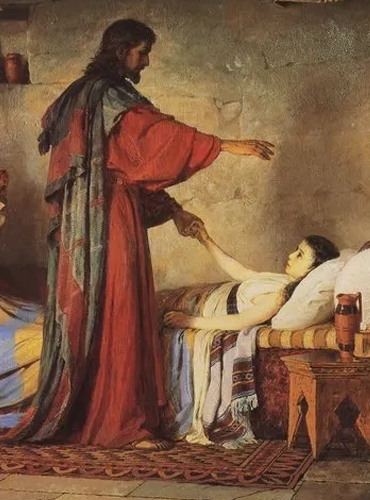Monday of the Fourteenth Week in Ordinary Time – Mt 9:18-26
Today’s Gospel presents us a very interesting series of events: we have a miracle on the way to a miracle, a sort of story within a story, all of which casts light on the nature of suffering and the importance of faith. Matthew’s version of the story is less detailed than the other synoptic versions; Mark and Luke both tell us other facts, such as that the “official” is named Jairus, and that he is a synagogue official. However, Matthew’s streamlined version allows us to focus on three key points: first, Christ’s humility, second, His love for His suffering children, and, third, the need for faith. Humility, love, and faith.
The first thing that calls our attention is Christ’s humility. Commenting on the fact that Jesus “rose and followed the official,” one Church father writes: “We ought to admire and at the same time to imitate the humility and mercifulness of the Lord; as soon as ever He was asked, He rose to follow him that asked: ‘And Jesus rose, and followed him.’ Here is instruction both for such as are in command, and such as are in subjection. To [the second, that is, to those who are under authority] He has left an example of obedience; to those who are set over others He shows how earnest and watchful they should be in teaching; whenever they hear of any being dead in spirit, they should hasten to Him; ‘And his disciples went with him.’”[1] We can ask ourselves: how well do we live out humility and obedience in our families, in our communities, in our daily lives? Do we follow the example of Christ?
Second, we can see Christ’s great love for His suffering children and how much His children matter to Him. One Biblical scholar describes the scene rather poetically: “When [the woman] touched [Christ’s tassel], it was as if time stood still. It was as if we were looking at a motion-picture and suddenly the picture stopped, and left us looking at one scene. The extraordinary, and the movingly beautiful thing, about this scene is that all at once amidst that crowd Jesus halted; and for the moment it seemed that for him no one but that woman and nothing but her need existed. She was not simply a poor woman lost in the crowd; she was someone to whom Jesus gave the whole of Himself. For Jesus no one is ever lost in the crowd. . . . W. B. Yeats once wrote: ‘The love of God is infinite for every human soul, because every human soul is unique; no other can satisfy the same need in God.’ God gives all of Himself to each individual person.”[2] Do we believe that this is the love that Christ has for us?
Thirdly, we see the need for faith. When Jesus proclaims that the girl is sleeping, the crowd mocks Him. The Fathers of the Church have plenty to say about this: Saints Jerome and John Chrysostom says that it makes the miracle all the more evident, since they were convinced otherwise, and now are “convicted by their own words.” Christ sends them out because they lack faith in the One who raises people from the dead. However, considered in a more spiritual sense, Saint Gregory the Great says that the crowd represents worldly cares and concerns: unless we kick these out of our minds and hearts, we cannot be brought back to faith. Likewise, the monk Rabanus Maurus says that the girl represents the soul lost in thought that needs penance to be revived. In any event, we can say that in our lives, we need to have faith: this means, on one hand, to cast out worldly cares and concerns and to focus on the one thing necessary, and also to allow Christ to work in our souls.
Today, let us ask, through the intercession of Mary, Health of the Sick, for the graces of obedience, trust in God’s love, and a lively faith so that we might truly live for God.
[1] Citing Remigius in Aquinas, Catena Aurea.
[2] From the commentary of Barclay.






